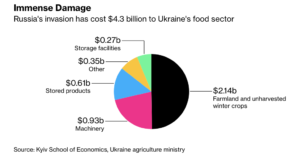A prolonged military conflict in the Middle East could potentially upend key commodity markets due to Iran’s control of the Strait of Hormuz, one of the world’s most important trade…
President Biden Highlights “Temporary Silos” to Help Export Ukraine Grain
Reuters writer Michelle Nichols reported yesterday that, “U.S. President Joe Biden said on Tuesday that temporary silos would be built along the border with Ukraine in a bid to help export more grain and address a growing global food crisis.
“Since the Russian invasion and blockade of Ukrainian Black Sea ports, grain shipments have stalled and more than 20 million tonnes are stuck in silos. Ukraine says it faces a shortage of silos for a new crop.
‘I’m working closely with our European partners to get 20 million tons of grain locked in Ukraine out onto the market to help bring down food prices,’ Biden told a Philadelphia union convention. ‘It can’t get out through the Black Sea because it’ll get blown out of the water.’
The Reuters article stated that, “Biden said Washington was developing a plan to get grain out by rail, but noted Ukrainian track gauges were different from those in Europe, so the grain has to be transferred to different trains at the border.
“‘So we’re going to build silos, temporary silos, on the borders of Ukraine, including in Poland,’ Biden said.
“Grain could be transferred from Ukrainian railway cars into the new silos, and then onto European freight cars to ‘get it out to the ocean and get it across the world,’ he said, adding the plan was taking time.”
Also yesterday, Reuters writer Pavel Polityuk reported that, “European countries will consider providing temporary granaries to Ukraine, which faces a shortage of silos for new grain crop, Ukrainian agriculture ministry said on Tuesday.
“Ukrainian agriculture minister earlier told Reuters in an interview that in autumn when the corn harvest is over, the shortage of storage capacity could reach up to 15 million tonnes.”
And a separate Reuters article yesterday by Pavel Polityuk stated that, “Russia’s invasion of Ukraine will create a global wheat shortage for at least three seasons by keeping much of the Ukrainian crop from markets, pushing prices to record levels, Ukraine’s agriculture minister told Reuters.”
“‘Ukraine will fall out of the market for a long time,’ Agriculture Minister Mykola Solskyi predicted in an interview.
“‘Now we are talking about three wheat harvests at the same time: we cannot take out last year’s crop, we cannot harvest and take out the current one, and we do not particularly want to sow the next one,’ he told Reuters.”
Meanwhile, Bloomberg writers Alonso Soto and Megan Durisin reported yesterday that, “Ukrainian grain shippers have carved out a fresh export route — via the Baltic Sea — to send their crops abroad.
“The country has been hunting for alternative paths for its crops as the war with Russia cuts off vital shipments from ports dotting the Black Sea, stoking global food prices and raising worries over hunger. Producers have resorted to sales by land instead, ferrying grain by railway, road and river to European Union neighbors.
“An initial Ukrainian corn cargo sent via Romania to Spain — a major buyer — was recorded in April, and Spain now has received its first cargo from Poland, according to Ramon Castro, a spokesman for Puerto A Coruña. The vessel Alppila arrived there Monday carrying 18,000 tons of corn that were hauled by trucks from Ukraine, he said.”

The Bloomberg article noted that, “The new shipping route may help ease Ukraine’s massive grain backlog and buoy feed supplies for EU livestock farmers, who face surging costs.”
Elsewhere, Steven Erlanger reported in yesterday’s New York Times that, “And many in Europe are eager to find a way, even if it’s a temporary cease-fire, to resume Ukrainian grain exports as global food prices soar and parts of the world face a threat of famine.”
“European officials are discussing whether E.U. countries, in combination with Turkey and countries that need the grain, like Egypt, can arrange some sort of naval escort for ships exporting food,” the Times article said.
And Bloomberg writer Aine Quinn reported yesterday that, “Ukraine has suffered $4.3 billion in damage to farmland, machinery and livestock as a result of Russia’s invasion, according to the Kyiv School of Economics.

“About half of the ‘already immense’ destruction from the war comes from pollution caused by mines and unharvested crops, according to a report by authors Roman Neyter, Hryhorii Stolnikovych, and Oleg Nivievskyi. Almost a quarter of the total — $926 million — accounts for damage done to farm machinery due to military activity and occupation, they write.”





